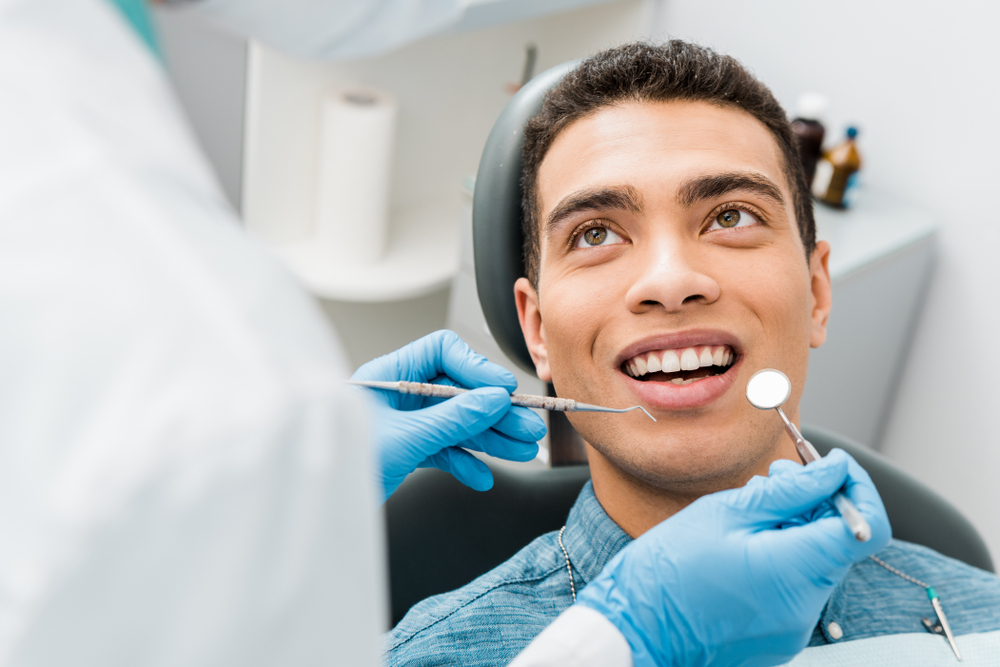Expert Tips on Finding the Best Toothbrush from Dr. Inigo at Inigo Dentistry
When it comes to maintaining good oral health, one of the most important tools in your dental care routine is your toothbrush. It may seem like a simple decision, but choosing the right toothbrush is essential for effectively cleaning your teeth and gums. With so many options available, it can be confusing to know where to start.
The best electric toothbrush features oscillating technology, a built-in timer, a pressure sensor, and a long-lasting battery. These features ensure a thorough clean and help maintain optimal oral health. At Inigo Dentistry, we believe that a good toothbrush is key to preventing cavities, gum disease, and maintaining overall oral health. In this blog post, we’ll guide you through the different types of toothbrushes and help you make an informed choice for your oral care.
To schedule an appointment with our Ontario dentist or to learn more about your oral care, contact our Fort Erie office at 905-871-2903 or our Ridgeway office at 905-894-5555. We also proudly serve patients coming from Niagara Falls, St. Catharines, Welland, and the surrounding areas.

Understanding Your Oral Health and Toothbrush Choices
Oral health is a vital part of your overall well-being. Good oral hygiene involves more than just brushing your teeth—it’s about using the right tools to ensure your teeth and gums stay clean and healthy. A toothbrush that’s too hard, too soft, or improperly used could lead to issues like enamel wear, gum irritation, or ineffective cleaning.
It is also essential to use fluoride toothpaste in conjunction with proper brushing techniques to maintain optimal dental care.
The Link Between Oral Health and Overall Health
Oral health is closely linked to overall health, and problems in the mouth can affect the rest of the body. Good oral health offers clues about overall health, and neglecting oral health can lead to serious health consequences. Research has shown that there is a strong connection between oral health and overall health, with oral health problems being linked to various systemic diseases.
For example, studies have found that people with gum disease are more likely to develop heart disease, diabetes, and respiratory infections. Additionally, certain medications, such as decongestants and antidepressants, can lower saliva flow, increasing the risk of oral health problems. Furthermore, oral germs and inflammation are linked to periodontitis, a severe form of gum disease.
What Makes a Toothbrush Effective?
The effectiveness of your toothbrush depends on its design, bristle texture, and how well it reaches all the surfaces of your teeth. No matter how diligent you are about brushing, using the wrong toothbrush could hinder your efforts and lead to dental problems.
Pressure sensors in electric toothbrushes signal users when they are applying too much pressure while brushing. This technology not only enhances user experience by preventing potential damage to gums and enamel but also contributes to more effective oral care by encouraging proper brushing technique.
What Are the Different Types of Toothbrushes?
1. Manual Toothbrushes
Manual toothbrushes are a popular choice due to their affordability and simplicity. They come in a variety of shapes and sizes, making it easier to find one that fits your mouth comfortably. When selecting a manual toothbrush, make sure to choose one with soft bristles to avoid damaging your enamel and gums. Look for one with an ergonomic handle for ease of use.
2. Electric Toothbrushes
Electric toothbrushes are a great option for individuals who need a bit more help with their brushing technique. With features like rotating or vibrating heads, electric toothbrushes can clean teeth more effectively than manual ones, making them a great choice for people with limited mobility or those who want a more thorough clean. Many electric toothbrushes even come with built-in timers to ensure you’re brushing for the recommended two minutes. The two-minute timer feature, which often buzzes or signals at intervals, helps improve brushing habits and leads to better oral hygiene by encouraging a thorough, two-minute cleaning routine.
3. Powered vs. Rechargeable Electric Toothbrushes
Electric toothbrushes come in two main types: powered (battery-operated) and rechargeable. Rechargeable models tend to last longer and are more cost-effective in the long run, but powered toothbrushes are a great budget-friendly option. Electric toothbrushes that utilize rechargeable batteries offer longer battery life and reduced waste compared to models with replaceable batteries. Both are effective, so it’s a matter of personal preference.
Specialized Toothbrushes for Sensitive Gums or Gum Health
If you suffer from sensitive teeth or gums, it’s important to choose a toothbrush that minimizes irritation. Look for toothbrushes designed specifically for sensitive gums, which typically feature extra-soft bristles. These are gentle on your gums and enamel while still being effective in cleaning your teeth.
Electric toothbrushes can also contribute to better gum care by reducing plaque and gingivitis, which is essential for maintaining gum health.
How to Choose the Right Toothbrush for You
When choosing the right toothbrush for your oral health, there are several factors to keep in mind:
1. Bristle Firmness
Soft-bristled toothbrushes are generally the best choice for most people. Hard or medium bristles can be too abrasive on your enamel and gums, leading to gum recession or enamel wear over time. Always choose a toothbrush with soft bristles unless your Ontario dentist recommends otherwise.
2. Head Size
The size of your toothbrush head should allow you to reach all areas of your mouth comfortably, including the back teeth. A smaller head typically allows for better maneuverability, especially if you have a smaller mouth or tighter spaces between your teeth.
3. Handle Design
The handle of your toothbrush should be comfortable to hold and easy to control while brushing. Look for a non-slip handle for better grip, especially if you have arthritis or other mobility issues.
4. Brush Type
As mentioned earlier, you can choose between a manual or electric toothbrush, depending on your preference and brushing habits. If you’re unsure about which type is best for you, Dr. Inigo can help guide you toward the right option based on your needs.
When considering electric toothbrushes, it’s worth comparing different models. For instance, the Oral-B Pro 500 and Philips Sonicare 1100 offer excellent performance and value, especially when compared to other electric toothbrushes available at lower price points.
Special Considerations
1. For People with Sensitive Teeth and Gums
If you have sensitive teeth and gums, it’s essential to choose an electric toothbrush with a gentle cleaning mode and soft bristles. Look for a toothbrush with a pressure sensor that alerts you when you’re brushing too hard, as this can help prevent further irritation. Additionally, consider using a toothpaste specifically designed for sensitive teeth and gums.
2. For People with Orthodontic Appliances
If you have orthodontic appliances, such as braces or retainers, it’s crucial to choose an electric toothbrush with a smaller brush head that can easily maneuver around the appliances. Look for a toothbrush with a gentle cleaning mode and soft bristles to prevent damage to the appliances and surrounding teeth and gums.
Smart Toothbrushes and Technology
Smart toothbrushes are equipped with advanced technology that can help improve oral health and prevent dental emergencies. These toothbrushes often come with features such as Bluetooth connectivity, apps, and sensors that track brushing habits, pressure, and technique. Some smart toothbrushes even have artificial intelligence that can detect oral health problems and provide personalized recommendations.
When choosing a smart toothbrush, consider the following features:
- Bluetooth Connectivity: Look for a toothbrush that can connect to your smartphone or tablet via Bluetooth, allowing you to track your brushing habits and receive personalized feedback.
- App: Choose a toothbrush with a user-friendly app that provides detailed information on your brushing habits, including duration, frequency, and technique.
- Sensors: Consider a toothbrush with sensors that track pressure, technique, and oral health problems, such as gum disease or tooth decay.
- Artificial Intelligence: Look for a toothbrush with artificial intelligence that can detect oral health problems and provide personalized recommendations.
By considering these features, you can choose a smart toothbrush that meets your oral health needs and helps you maintain good oral hygiene.
How to Brush Properly
No matter which toothbrush you choose, proper brushing technique is just as important as the toothbrush itself. Follow these guidelines for optimal results:
Powered brushes are particularly effective in plaque removal and gingivitis reduction compared to manual toothbrushes.
- Brush for Two Minutes – Spend at least two minutes brushing your teeth to ensure you clean all surfaces thoroughly. Most electric toothbrushes have built-in timers to help you brush for the right amount of time.
- Use Gentle Pressure – Avoid brushing too hard. Pressing too forcefully on your teeth can damage your enamel and irritate your gums.
- Brush All Areas – Don’t just focus on the front of your teeth! Make sure to brush the backs, chewing surfaces, and gum line to remove all plaque and food particles.
- Brush Twice a Day – The American Dental Association recommends brushing your teeth at least twice a day—once in the morning and once before bed—to keep plaque and bacteria at bay.

Why You Should Visit Your Dentist Regularly
Even with the best toothbrush, it’s important to visit your dentist regularly for check-ups and professional cleanings. At Inigo Dentistry, we recommend a visit at least twice a year to monitor your oral health, remove tartar buildup, and catch potential problems early.
If you’re not sure which toothbrush is right for you, or if you have any concerns about your oral hygiene routine, Dr. Inigo is here to help. Our team can provide personalized recommendations and ensure that you’re on the path to optimal oral health.
Keep Your Smile Healthy with Inigo Dentistry
At Inigo Dentistry, we believe in providing our patients with the best tools and information to maintain a healthy smile. If you have questions for our Ontario dentist about choosing the right toothbrush, or if you’d like to schedule an appointment with Dr. Inigo, don’t hesitate to contact our Fort Erie office at 905-871-2903 or our Ridgeway office at 905-894-5555. We’re here to help you keep your teeth and gums healthy and your smile bright! We also proudly serve patients coming from Niagara Falls, St. Catharines, Welland, and the surrounding areas.
